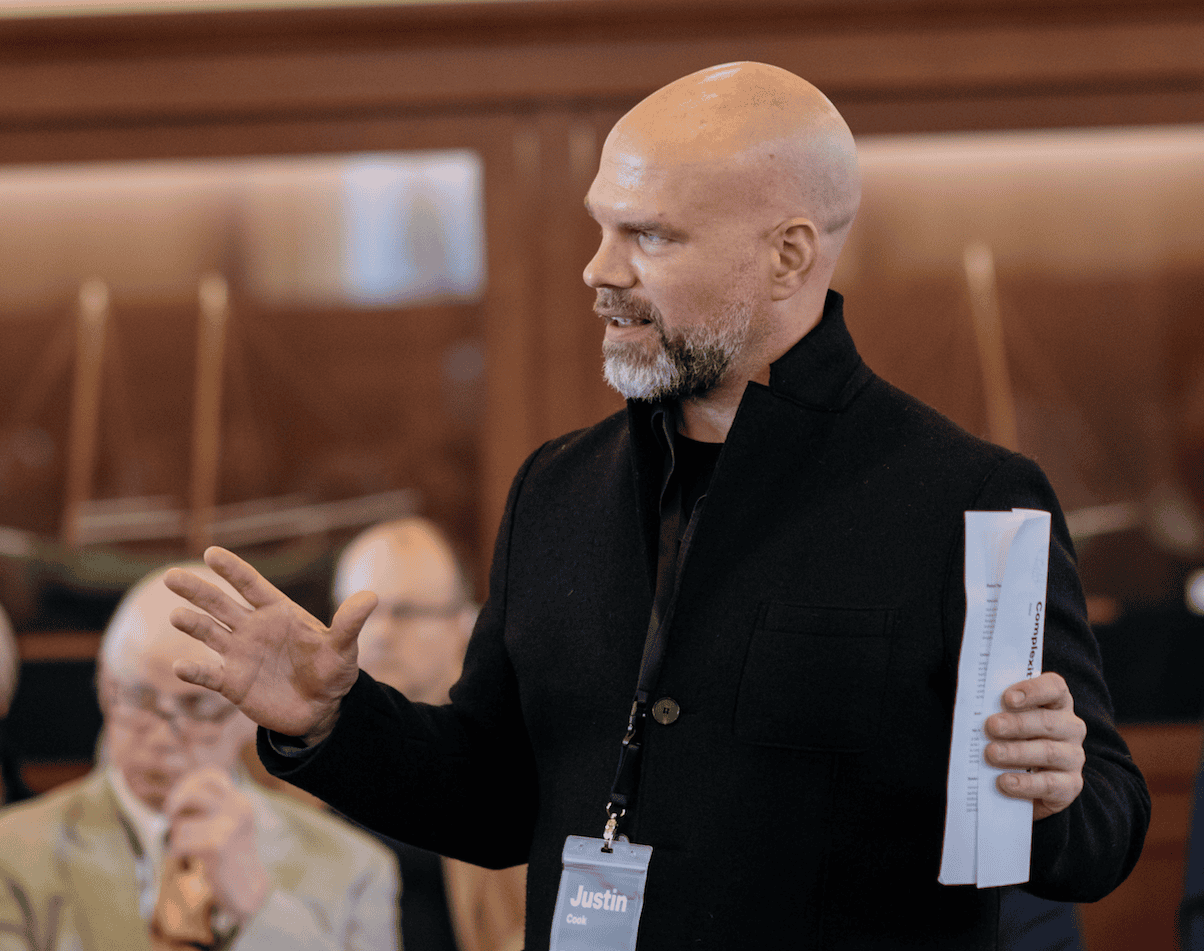Justin W. Cook
Pierce Anderson Design Critic in Design Engineering

Justin W. Cook is the father of three boys. He grew up on the Puget Sound in a small town where he initially trained as a carpenter and later an architect. As a graduate student, his curiosity about what else his emerging practice could do led him to work on systemic challenges in healthcare in order to build more humane systems of care. His current work spans healthcare, sustainability, education, and housing, with a particular emphasis on designing novel organizational architectures to address systemic issues.
Cook is the Founding Executive Director of the Center for Complexity (CfC) at Rhode Island School of Design, established in 2018. The CfC is a cutting-edge platform for research, experimentation, and problem-solving that tackles multifaceted challenges defying reductionist approaches. It embodies RISD’s longstanding commitment to epistemological curiosity and embodied knowing, serving as a unique interface between RISD’s academic environment and external organizations.
Under Cook’s leadership, CfC engages in multiyear, multi-organization research projects on diverse topics ranging from nuclear disarmament to the opioid crisis. CfC embraces transdisciplinarity, integrating multiple ways of knowing to address complex systemic challenges. This approach democratizes knowledge production, breaking down hierarchies between academic and non-academic expertise, and between quantitative and qualitative forms of evidence.
Alongside the CfC, Cook is serving as Design Critic in Architecture in the Master of Design Engineering program at the Harvard Graduate School of Design, specializing in strategic design, systems thinking, and innovative approaches to complex global challenges.
In addition to his academic roles, Cook is the cofounder of Integrated Design Cubed, LLC (IDCubed), a company addressing climate and housing crises through sustainable, modular mass timber buildings. He also leads Commonwealth Advanced Projects LLC, providing strategic design consulting to organizations such as Google, Fidelity Investments, Knight Foundation, Bloomberg Philanthropies, IBM, and the UN.
Cook has a longstanding interest in the intersection of design, sustainability, and societal wellbeing. He is the author of “Sustainability, Human Wellbeing and the Future of Education” (Palgrave, 2018), which explores the future of education in the context of sustainability and human wellbeing. His recent publications include “Polycene.design” (2024), “Collapse” (2024), and “Carry Forward” (2023), all published by Rhode Island School of Design.
From 2008 to 2018, Cook was Senior Lead for Strategy at the Finnish Innovation Fund, Sitra, where he focused on strategic design, urban systems, decarbonization, impact investing, and the future of education. During this time, he was a founding member of the Helsinki Design Lab, which has been emulated by governments and NGOs worldwide. He has also served as an advisor to the OECD’s Observatory for Public Sector Innovation, leading a project funded by the European Commission on how systems and design methodologies can help the public sector address complex challenges.
Cook has collaborated with MIT’s Collaborative Initiatives on projects like the Clinical Trials Systems Project, a partnership with Johns Hopkins University Systems Institute aimed at improving the clinical trials system.
He has taught at various institutions, including RISD’s Institute for Design and Public Policy, a collaboration with the US Department of State Bureau of Educational and Cultural Affairs, and has been a studio instructor and pedagogy lead for programs enabling key innovators within the federal government to deploy design principles in addressing complex challenges.
Cook received a Master of Architecture from Harvard University, where he earned a commendation for outstanding academic achievement, and a Bachelor of Arts from the University of Washington. He has been invited to speak at numerous institutions and conferences globally on topics related to strategic design, systems thinking, and applied complexity.